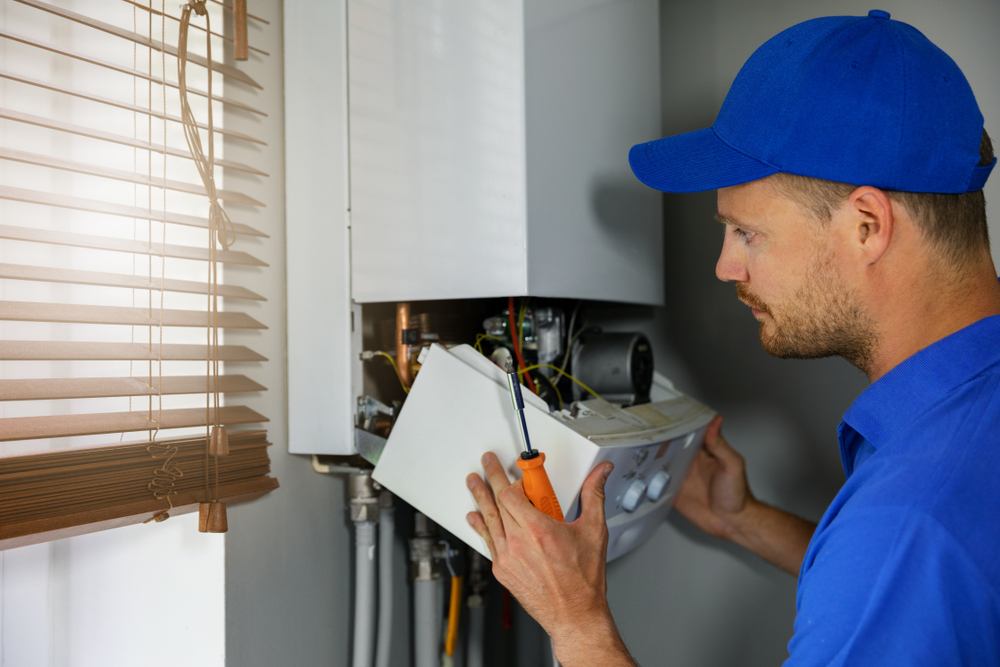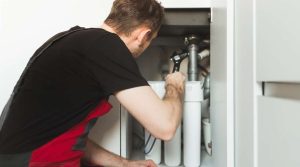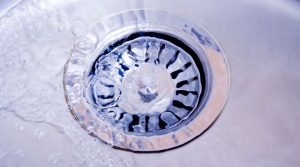As a full-service plumbing contractor located in Round Rock, TX, we know that homeowners prioritize energy efficiency and sustainability in their homes. Tankless water heaters have become increasingly popular due to their compact size, longer-lasting mechanisms, and energy efficiency. This comprehensive guide is designed to inform you about the benefits of tankless water heaters and provide expert advice on repair, installation, and maintenance practices to help you make the best decisions for your home plumbing systems.
Tankless water heaters, also known as on-demand or instantaneous water heaters, only heat water when you need it, meaning less energy is wasted keeping a storage tank full of heated water. These innovative systems provide numerous benefits, including space-savings, reduced energy bills, and a continuous supply of hot water. With a longer lifespan and better energy efficiency, it’s no wonder that more and more homeowners are considering tankless water heaters as the ideal solution for their hot water needs.
However, like any home appliance or system, tankless water heaters also require proper installation and maintenance to work at their optimum performance. Understanding the process of installation is key to ensuring the system is the right fit for your home, as well as to avoid common issues that could lead to malfunctions or reduced efficiency. Regular maintenance, meanwhile, not only prolongs the life of your water heater but also helps maintain its energy efficiency and reduces the chances of unexpected breakdowns.
In this guide, we will delve into the different types of tankless water heaters, their mechanisms, proper installation and repair methods, and how to optimize your system for energy efficiency. We will discuss the importance of understanding various factors such as the size and capacity of the heater, fuel types, and venting options to make the best decision for your home. Additionally, we will share expert advice on routine maintenance practices, troubleshooting common problems, and when to seek professional help for repairs.
Whether you are considering upgrading to a tankless water heater or already own one and are looking to maximize its benefits, this article will provide valuable insights and expert guidance to help you make the most of your home’s plumbing system. Stay tuned to learn everything you need to know about tankless water heater repair, installation, and maintenance. And remember, if you need assistance with your water heater or any other plumbing needs, our team at JustUs Plumbing Services is just a call away.
Understanding Types and Mechanisms of Tankless Water Heaters
To make the most informed decision, it’s essential to familiarize yourself with the different types of tankless water heaters and their mechanisms. These heaters are broadly categorized into two types: electric and gas-powered. Electric water heaters use an electric element to heat the water, while gas-powered heaters incorporate a gas burner. Both types can show significant differences in energy efficiency, operational costs, and installation requirements.
Tankless water heaters use a heat exchanger to heat the water when a hot water tap is turned on. Water flows through the exchanger, where it gets heated before being directed to the faucet. This means no more waiting for a storage tank to fill up or dealing with limited hot water supply, resulting in increased efficiency and convenience.
Selecting the Right Size and Capacity
One of the keys to maximizing the benefits of your tankless water heater is choosing the right size and capacity suitable for your home. The size and capacity depend on two factors: flow rate and temperature rise. Flow rate refers to the volume of water the system can deliver, measured in gallons per minute (GPM). Temperature rise is the difference between the incoming cold water temperature and the desired output hot water temperature.
To determine the appropriate size, start by listing the hot water devices you intend to use simultaneously. Note their flow rate (GPM) and add these values together. Next, determine the required temperature rise by subtracting the incoming water temperature from the desired output temperature. This information will help you choose a suitable tankless water heater according to your needs and prevent dissatisfaction due to low hot water pressure.
Expert Tips on Installation and Venting
Proper installation is paramount for optimal performance and safety. It’s highly recommended to hire a professional plumber experienced in tankless water heater installations, as DIY attempts can lead to dangerous situations and void your warranty.
When installing a tankless water heater, consider the following factors:
- Location: Choose an easily accessible and well-ventilated area for your heater. Ensure sufficient space around the unit for any necessary maintenance or repairs. Avoid cramped or confined locations to prevent damage to the surroundings due to heat.
- Fuel Type: Make sure to select a unit that is compatible with your home’s fuel source, whether it’s electricity or natural gas. Consult with a professional plumber to ensure proper connections and compliance with local codes and regulations.
- Venting: Adequate venting is essential, especially for gas-powered units. Proper venting not only removes combustion gases but also supplies fresh air for efficient combustion. Your plumber can help you select the appropriate venting system and install it following the manufacturer’s guidelines and local regulations.
Maintaining and Troubleshooting Your Tankless Water Heater
Regular maintenance is crucial for prolonging the life of your tankless water heater, ensuring its optimal performance, and preventing unexpected breakdowns. Here are some maintenance steps to follow:
- Annual Flushing: Mineral buildup inside the heat exchanger can reduce efficiency and lead to corrosion. It’s essential to flush the system once a year using a vinegar solution to remove any buildup. This is especially important in areas with hard water.
- Inspect the Venting System: Check for any signs of blockage, damage, or corrosion in the venting system. Keep the vent area clear of debris and insects that could obstruct the airflow.
- Clean the Filters: Regularly clean the inlet and outlet filters to ensure smooth water flow. This will prevent any possible problems associated with restricted water flow, such as reduced water pressure.
- Check the Electrical and Gas Connections: Inspect the connections to ensure they are secure and free from any corrosion or damage. Keep an eye out for any gas leaks or faulty electrical components.
Conclusion
Tankless water heaters offer numerous benefits, including energy efficiency, space savings, and a continuous supply of hot water. However, proper installation, maintenance, and repair are essential for enjoying these advantages. Understanding the different types of heaters, selecting the appropriate size and capacity, and following recommended installation and maintenance practices will help you make the most of your investment.
Looking for reliable and professional water heater repair in Round Rock? Look no further than JustUs Plumbing Services! Whether you need tankless water heater installations, repairs, or routine maintenance, our experienced plumbing contractors have got you covered. Don’t risk the safety and reliability of your system by attempting repairs yourself – trust the experts at JustUs Plumbing Services to get the job done right. Contact us today to schedule your appointment and ensure optimal performance from your water heater. Give us a call today and experience the JustUs Plumbing Services difference!






